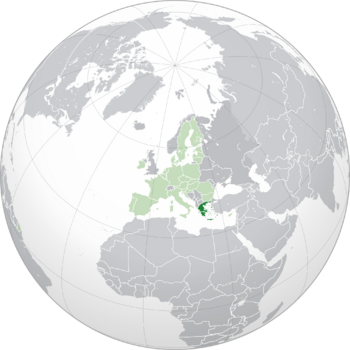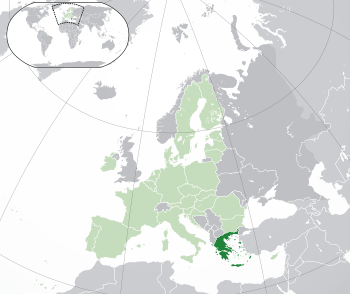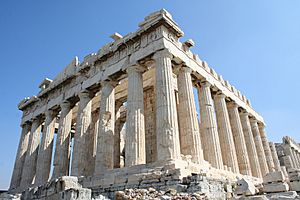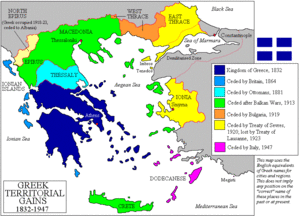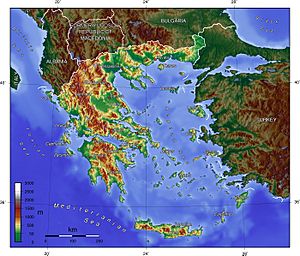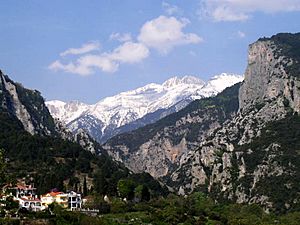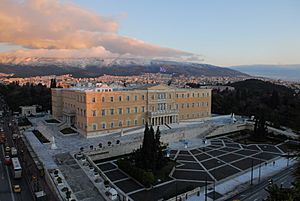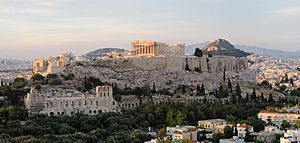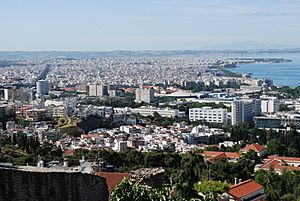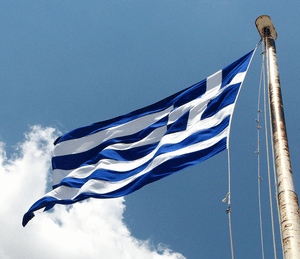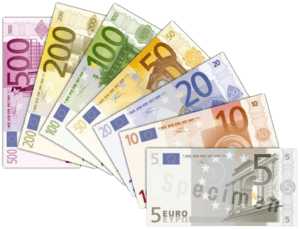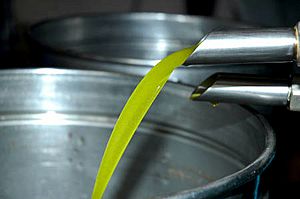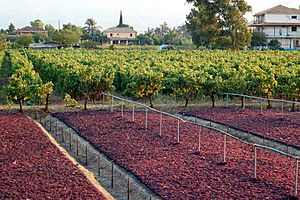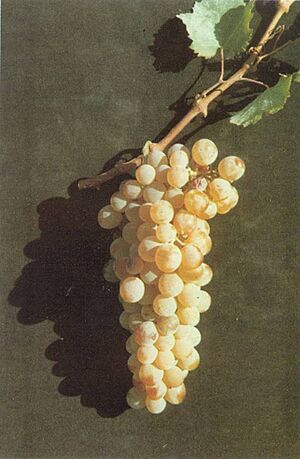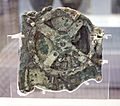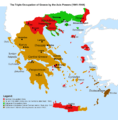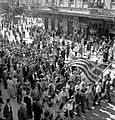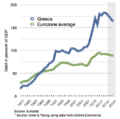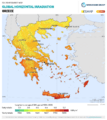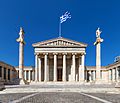Greece facts for kids
Quick facts for kids
Hellenic Republic
|
|
|---|---|
|
Motto: Ελευθερία ή Θάνατος
Elefthería í Thánatos (English: "Freedom or Death") |
|
|
Location of Greece (dark green)
– on the European continent (light green & dark grey) |
|
| Capital and largest city
|
Athens 37°58′N 23°43′E / 37.967°N 23.717°E |
| Official language and national language |
Greek |
| Religion
(2017)
|
|
| Demonym(s) |
|
| Government | Unitary parliamentary republic |
| Katerina Sakellaropoulou | |
| Kyriakos Mitsotakis | |
|
• Parliament Speaker
|
Konstantinos Tasoulas |
| Legislature | Hellenic Parliament |
| Establishment history | |
|
• Independence declared from the Ottoman Empire
|
25 March 1821 (traditional starting date of the Greek War of Independence), 15 January 1822 (official declaration) |
| 3 February 1830 | |
|
• Third Hellenic Republic
|
24 July 1974 |
|
• Current constitution
|
11 June 1975 |
| Area | |
|
• Total
|
131,957 km2 (50,949 sq mi) (95th) |
|
• Water (%)
|
1.51 (2015) |
| Population | |
|
• 2023 estimate
|
|
|
• 2021 census
|
|
|
• Density
|
78.9/km2 (204.4/sq mi) (105th) |
| GDP (PPP) | 2024 estimate |
|
• Total
|
|
|
• Per capita
|
|
| GDP (nominal) | 2024 estimate |
|
• Total
|
|
|
• Per capita
|
|
| Gini (2023) | ▲ 31.8 medium |
| HDI (2022) | very high · 33rd |
| Currency | Euro (€) (EUR) |
| Time zone | UTC+02:00 (EET) |
|
• Summer (DST)
|
UTC+03:00 (EEST) |
| Date format | dd.mm.yyyy (AD)b |
| Driving side | right |
| Calling code | +30 |
| ISO 3166 code | GR |
| Internet TLD | |
|
|
Greece (Greek: Ελλάδα or Ελλάς), officially called the Hellenic Republic (Greek: Ελληνική Δημοκρατία), is a country in Southeastern Europe. Its capital city is Athens.
Greece shares borders with Albania, North Macedonia, and Bulgaria to the north. To the east, it borders Turkey. The Aegean Sea is to the east and south of mainland Greece. The Ionian Sea is to the west. Both seas are part of the Eastern Mediterranean Sea and have many islands.
The official language spoken in Greece is Greek. About 99% of the people speak it. Many Greeks also learn English, French, and German in school. Greece became a member of the European Union in 1981.
Contents
History of Greece
Greece has one of the world's richest histories. Ancient Greece was a very advanced civilization. It is famous for its many thinkers, called philosophers, like Plato and Aristotle. Great kings like Alexander the Great and Leonidas also came from Greece.
Greece is known as the birthplace of Democracy. City-states like Athens were the first to let people elect their leaders. This was different from having kings rule everything. During the time of Alexander the Great, a huge Greek empire was formed. It stretched from modern Greece to Egypt and Iran, reaching almost to India. This time is called the Hellenistic period, meaning 'Greek-dominated period'. The Greek language became the 'lingua franca' (a common language for people who speak different languages) of the Middle East. This is like how English is used internationally today.
Later, the Roman Empire ruled Greece. Many people say that Rome conquered Greece with its army, but Greece conquered Rome with its culture. The Roman Empire then became known as the Greco-Roman (or Greek-Roman) civilization. When the Roman Empire split, Greeks became the rulers of the East Roman Empire. Greek became the official language of this empire. It included all the eastern Mediterranean Sea, Turkey, Egypt, and other nearby countries.
Greece was then taken over by the Ottoman Empire for about 400 years. Some parts of Greece, like Thessaloniki, were under Ottoman rule for 500 years. They became part of Greece less than 100 years ago.
The Greek War of Independence traditionally began on March 25, 1821. Greece became an independent country (a republic) in 1828. In 1832, the United Kingdom and Russia made Greece a kingdom. A German family, the Wittelsbach dynasty, ruled it.
Greece fought alongside the Allies in both World War I and World War II. In 1912, Greece joined the Balkan Wars. It gained many areas that are part of the country today, like Greek Macedonia and the Aegean Sea islands. In 1920, Greece grew even larger. However, some areas it gained in Turkey were returned to Turkey in 1923. Greece did keep Western Thrace.
In 1940, Italy invaded Greece. But Greece managed to defeat the Italian invasion. This was the first victory for an Allied country against an Axis power (the side of Hitler). After Italy's defeat, Hitler decided to attack Greece sooner than planned. Germany invaded on April 6, 1940. They captured Greece's second-largest city, Thessaloniki, on April 9. Athens was captured on April 27.
Greece suffered a lot of damage in the Second World War. It also had a civil war between 1946 and 1949. This left the country very poor. The Greek civil war was fought between communists and those who supported the king. The king's supporters had help from the United Kingdom and the United States.
In 1967, the military took control of Greece. They limited democracy. Free elections were held again seven years later. In 1974, Greeks voted to remove the king and declared a republic. Greece became a member of the European Union in 1981. Greece grew quickly in the 1990s. However, some of the country's economic numbers were changed to look better than they were. This was done with the help of banks from the United States. In 2004, Greece hosted the Olympic Games for a second time. Since 2009, Greece has faced some economic challenges.
Geography and Climate
Greece is a mountainous country. It has a mainland that sticks out into the sea at the southern end of the Balkans. This mainland ends at the Peloponnese peninsula. The Corinth Canal separates the Peloponnese from the mainland. Greece has the 11th longest coastline in the world. This is because of its many bays and islands. Its coastline is about 13,676 kilometers (8,498 miles) long. The country is located between 34° and 42° N latitude and 19° and 30° E longitude.
Greece has a huge number of islands, between 1,200 and 6,000. About 227 of these islands have people living on them. Crete is the largest island and has the most people. Euboea is the second largest island. It is separated from the mainland by the 60-meter-wide Euripus Strait. Other large islands include Rhodes and Lesbos.
The Greek islands are usually grouped into different areas. These include the Argo-Saronic Islands near Athens, the Cyclades in the central Aegean Sea, and the North Aegean islands near Turkey. There are also the Dodecanese in the southeast, the Sporades near Euboea, and the Ionian Islands to the west of the mainland.
About 80% of Greece is made up of mountains or hills. This makes it one of the most mountainous countries in Europe. Mount Olympus is the highest mountain in Greece. It is 2,917 meters (9,570 feet) tall. In ancient Greek myths, it was the home of the Greek Gods. Western Greece has many lakes and wetlands. It is dominated by the Pindus mountain range. The Pindus mountains are a continuation of the Dinaric Alps. They reach 2,637 meters (8,652 feet) at Mt. Smolikas, which is the second-highest peak in Greece. These mountains have historically made travel difficult between east and west.
The Pindus range continues through the central Peloponnese. It crosses the islands of Kythera and Antikythera. It finally ends in the southwestern Aegean, on the island of Crete. The islands in the Aegean Sea are actually the tops of underwater mountains. These mountains were once part of the mainland. The Pindus mountains have high, steep peaks. They often have many deep canyons and other rocky landscapes. The amazing Vikos Gorge, in the Pindus range, is listed as the deepest gorge in the world. Another famous place is Meteora, where medieval Greek Orthodox monasteries are built on top of tall rock pillars.

Northeastern Greece has another high mountain range, the Rhodope range. This range spreads across the region of East Macedonia and Thrace. This area has large, thick, ancient forests. One famous forest is the Dadia forest in the Evros region, in the far northeast.
Large flat areas are mainly found in Thessaly, Central Macedonia, and Thrace. These areas are very important for the economy. They are some of the few places in Greece where farming can be done. Rare sea animals like Pinniped Seals and the Loggerhead sea turtle live in the seas around mainland Greece. Its thick forests are home to the endangered brown bear, the lynx, the Roe deer, and the Wild Goat.
The climate of Greece is mostly Mediterranean. This means it has mild, wet winters and hot, dry summers. This climate is found in all coastal areas. This includes Athens, the Cyclades, the Dodecanese, Crete, the Peloponnese, the Ionian Islands, and parts of Central Continental Greece. The Pindus mountain range greatly affects the country's climate. Areas to the west of the mountains are much wetter. This is because they get more moisture from south-westerly winds. Areas to the east are drier due to a rain shadow effect.
The mountainous areas of Northwestern Greece (parts of Epirus, Central Greece, Thessaly, Western Macedonia) have an Alpine climate. This climate also occurs in the mountainous central parts of Peloponnese. These areas get heavy snowfalls. The inland parts of northern Greece, in Central Macedonia and East Macedonia and Thrace, have a temperate climate. This means they have cold, damp winters and hot, dry summers with frequent thunderstorms. Snow falls every year in the mountains and northern areas. Even southern areas like Athens can get brief snowfalls.
Government and Cities
Greece's current Constitution was put in place in 1975. It makes Greece a parliamentary republic. The Constitution has 120 articles. It divides power into three parts: the executive (government), the legislative (Parliament), and the judicial branch (courts). It also protects many civil liberties and social rights.
The Parliament has 300 members and makes the laws. The Government and the President of the Republic hold executive power. The President is the head of state. The Parliament elects the President for a five-year term. The President signs laws passed by Parliament. However, a change in the Constitution in 1986 made the President's role mostly ceremonial. The most powerful person is the Prime Minister. The Prime Minister is the head of government. The leader of the political party that wins the most votes in Parliament becomes Prime Minister. The President officially appoints the Prime Minister. The President also appoints and removes other government members based on the Prime Minister's advice.
Members of Parliament are chosen in direct elections. These elections use a system that helps the party with the most votes. This often leads to single-party governments. Parliamentary elections happen every four years. But early elections can be called by the President if the government suggests it, or if Parliament votes against the government. The voting age in Greece is 17. Women gained the right to vote in 1952.
Major Cities in Greece
Almost two-thirds of the Greek people live in cities. Greece's largest and most important cities are Athens and Thessaloniki. Athens has about 4 million people. Thessaloniki has about 1 million people. Other big cities with over 100,000 people include Patras, Heraklion, Larissa, Volos, Rhodes, Ioannina, Chania, and Chalcis.
Here are Greece's largest cities by population in their urban areas, based on the 2011 census:
- Athens - population 3,090,508
- Thessaloniki - population 788,952
- Patras - population 213,984
- Heraklion - population 173,993
- Larissa - population 162,591
- Volos - population 144,449
- Rhodes - population 115,490
- Ioannina - population 112,486
- Chania - population 108,310
- Agrinio - population 106,053
People of Greece
Greece is a small country compared to others like the United States or France. The population of Greece is over 10 million people. Most people in Greece are Greeks, making up 94% of the population. There are also many Albanians in Greece, about 4% of the population. Other nationalities make up the remaining 2%.
The Greek government officially recognizes only one minority group: the Turkish people in the region of Thrace. There is a disagreement between Greece and North Macedonia about a Macedonian minority. Greece does not officially recognize a Macedonian minority. The 2001 census showed only 747 citizens from North Macedonia in Greece. North Macedonia claims there are up to 300,000 ethnic Macedonians in Greece. However, Greece says that if such a minority exists, it would be no more than 30,000 people. This is supported by international organizations.
Greek Flag
The Greek flag was officially adopted in 1828. It was first used on boats and ships, and as a national flag when flown outside Greece. A different flag (white cross on a blue background) was used on land within Greece from 1828 to 1969, and again from 1975 to 1978. In 1978, the current flag became the national flag for all uses, and the older land flag was stopped.
There are many ideas about why the flag has blue and white colors. One idea is that blue stands for the sea and white for the waves. Other ideas include white for the waves and blue for the sky. White can also mean purity and freedom from harsh rule, while blue represents Greece. The flag has nine stripes. Legend says these stripes stand for the nine syllables in the phrase “Ελευθερία ή Θάνατος’’. This means “freedom or death.’’ The cross on the flag stands for Christianity.
Economy of Greece
Greece is a capitalist country, like the United States and France. Greece has the largest number of trading ships (a 'merchant navy') in the world. Tourism is also a very important way for Greece to earn money. In the 20th century, Greece had its own money. But now it uses the Euro, like most other European Union countries.
Greece has adopted some welfare state policies. These include public healthcare and free education, similar to many other European countries. However, Greece has not collected enough taxes to pay for these services. The pension system (money paid to retired people) is especially expensive. Thousands of Greeks retired before the age of 55. Political leaders have lowered the retirement age several times. Currently, the average retirement age is 50 for women and 55 for men.
This has created financial challenges for Greece. The country has a large debt of about €350 billion. This debt is about 170% of the country's total GDP (Gross Domestic Product). Greece also buys more goods from other countries than it sells. This is called a trade deficit. The country is now trying to reduce its spending and get loans to avoid financial problems.
Farming and Agriculture
In 2010, Greece was the European Union's biggest producer of cotton (183,800 tons) and pistachios (8,000 tons). It was second in producing rice (229,500 tons) and olives (147,500 tons). Greece ranked third in producing figs (11,000 tons), almonds (44,000 tons), tomatoes (1,400,000 tons), and watermelons (578,400 tons). It was fourth in producing tobacco (22,000 tons). Farming makes up 3.8% of Greece's GDP. It employs 12.4% of the country's workers.
Greece gets a lot of help from the Common Agricultural Policy of the European Union. Because Greece joined the European Community, much of its farming system has improved. Agricultural output has increased. Between 2000 and 2007, organic farming in Greece grew by 885%. This was the highest growth percentage in the EU.
Shipping Industry
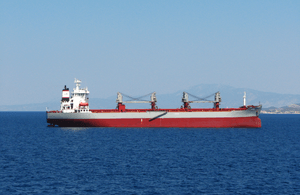
The shipping industry has been a very important part of Greece's economy since ancient times. Today, shipping is one of the country's most important industries. It makes up 4.5% of Greece's GDP. It employs about 160,000 people, which is 4% of the workforce. It also accounts for one-third of the country's trade deficit.
In the 1960s, the size of the Greek fleet almost doubled. This was mainly due to investments by shipping leaders like Aristotle Onassis and Stavros Niarchos. The modern Greek shipping industry started after World War II. Greek business owners bought many surplus ships from the U.S. government.
According to a 2011 report, the Greek merchant navy is the largest in the world. It controls 16.2% of the world's total shipping capacity. This is up from 15.96% in 2010. However, it is a drop from 18.2% in 2006. The total weight of goods the country's merchant fleet can carry is 202 million dwt. This ranks it 1st in the world.
In terms of the total number of ships, the Greek Merchant Navy is 4th worldwide, with 3,150 ships. Of these, 741 are registered in Greece, and 2,409 are registered in other ports. Greece ranks first in both tankers and dry bulk carriers. It is fourth in the number of containers and fifth in other types of ships. However, today's fleet is smaller than its peak of 5,000 ships in the late 1970s. Also, the total number of ships flying a Greek flag (including non-Greek fleets) is 1,517. This is 5.3% of the world's total capacity, ranking it 5th.
Tourism in Greece

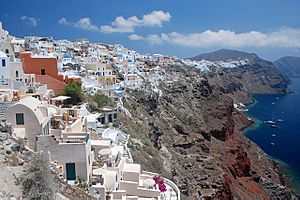
A large part of Greece's income comes from tourism. Tourism makes up 16% of the country's total economic output. This also includes the Tourism Council and the London-Based World Travel. According to statistics, Greece welcomed over 19.5 million tourists in 2009. This was an increase from 17.7 million tourists in 2007.
Most visitors to Greece in 2007 came from Europe, totaling 12.7 million. The largest number of visitors from a single country were from the United Kingdom (2.6 million). Germany was close behind with 2.3 million visitors. In 2010, the most visited region of Greece was Central Macedonia. It had 18% of the country's total tourists, or 3.6 million visitors. Attica was second with 2.6 million, and the Peloponnese had 1.8 million. Northern Greece is the most visited geographical region, with 6.5 million tourists. Central Greece is second with 6.3 million.
In 2010, Lonely Planet ranked Thessaloniki, Greece's northern and second-largest city, as the world's fifth-best party town. It was compared to cities like Dubai and Montreal. In 2011, Santorini was voted "The World's Best Island" by Travel + Leisure magazine. Its nearby island, Mykonos, came in fifth in the European category.
Greek Food and Drink
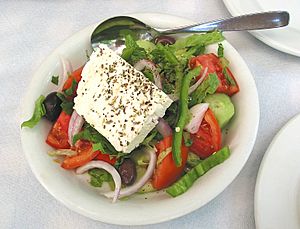
Greek cuisine is a great example of the healthy Mediterranean diet. This is especially true for dishes from Crete. Greek food uses fresh ingredients in many local dishes. Some popular ones are moussaka, stifado, Greek salad, fasolada, spanakopita, and souvlaki. Some dishes have been around since ancient Greece. These include skordalia (a thick paste of walnuts, garlic, and olive oil), lentil soup, retsina (wine with pine resin), and pasteli (a candy bar with sesame seeds and honey).
Throughout Greece, people often enjoy eating small dishes called meze. These include different dips like tzatziki, grilled octopus, small fish, feta cheese, dolmades (rice and nuts wrapped in vine leaves), various beans, olives, and cheese. Olive oil is added to almost every dish.
Sweet desserts like galaktoboureko are popular. Drinks like ouzo, metaxa, and many types of wines, including retsina, are also enjoyed. Greek food varies a lot from different parts of the mainland and from island to island. It uses some flavors more often than other Mediterranean foods. These include oregano, mint, garlic, onion, dill, and bay laurel leaves. Other common herbs and spices are basil, thyme, and fennel seed. Many Greek recipes, especially in northern Greece, use "sweet" spices with meat. For example, cinnamon and cloves are used in stews.
Greek Literature

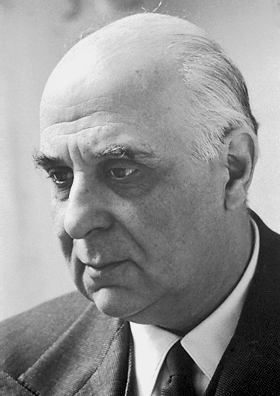
Greek literature can be divided into three main periods: Ancient, Byzantine, and Modern Greek literature.
The beginning of Greek literature features two huge works by Homer: the Iliad and the Odyssey. These were written around 800 BC or later. In the classical period, many types of writing became important. These included lyrical poetry, odes, pastorals, elegies, epigrams, and plays like comedies and tragedies. Also, historical writings, speeches, and philosophical discussions developed. The two main lyrical poets were Sappho and Pindar. This era also saw the start of drama.
Out of hundreds of tragedies written and performed in the classical age, only a few plays by three writers have survived. These are by Aeschylus, Sophocles, and Euripides. The plays by Aristophanes are also a great source of comedy. Herodotus and Thucydides are two of the most important historians from this time. The greatest writing in the 4th century BC was in philosophy, with the works of three great philosophers.
Byzantine literature refers to writings from the Byzantine Empire. These were written in different forms of Greek, from ancient to early modern. This literature shows the intellectual life of the Byzantine Greeks during the Christian Middle Ages.
Modern Greek literature is written in common Modern Greek. It began in the late Byzantine times, around the 11th century. The Cretan Renaissance poem Erotokritos is a masterpiece from this period. It is a verse romance written around 1600 by Vitsentzos Kornaros. Later, during the Greek Enlightenment, writers like Adamantios Korais and Rigas Feraios prepared the way for the Greek War of Independence (1821–1830) with their works.
Important writers in modern Greece include Dionysios Solomos, Andreas Kalvos, Angelos Sikelianos, Emmanuel Rhoides, Kostis Palamas, Penelope Delta, Yannis Ritsos, Alexandros Papadiamantis, Nikos Kazantzakis, Andreas Embeirikos, Kostas Karyotakis, Gregorios Xenopoulos, Constantine P. Cavafy, and Demetrius Vikelas. Two Greek authors have won the Nobel Prize in Literature: George Seferis in 1963 and Odysseas Elytis in 1979.
Related Pages
Images for kids
-
The entrance of the Treasury of Atreus (13th Century BC) in Mycenae
-
Herodotus (c. 484 BC—c. 425 BC), often considered the "father of history"
-
The Parthenon on the Acropolis of Athens, icon of classical Greece.
-
Alexander the Great, whose conquests led to the Hellenistic Age.
-
Map of Alexander's short-lived empire (334–323 BC). After his death the lands were divided between the Diadochi
-
The Antikythera mechanism (c. 100 BC) is considered to be the first known mechanical analog computer (National Archaeological Museum, Athens).
-
A view from the ancient royal Macedonian tombs in Vergina
-
Dome of Hagia Sophia, Thessaloniki (8th century), one of the 15 UNESCO's Paleochristian and Byzantine monuments of the city
-
The Palace of the Grand Master of the Knights of Rhodes, originally built in the late 7th century as a Byzantine citadel and beginning from 1309 used by the Knights Hospitaller as an administrative centre
-
The sortie (exodus) of Messolonghi, showing the Third Siege of Missolonghi, painted by Theodoros Vryzakis.
-
The Battle of Navarino in 1827 helped secure Greek independence.
-
The Entry of King Otto in Athens, painted by Peter von Hess in 1839.
-
Hellenic Army formation in the World War I Victory Parade in Arc de Triomphe, Paris, July 1919.
-
Map of Greater Greece after the Treaty of Sèvres, when the Megali Idea seemed close to fulfillment, with Eleftherios Venizelos as its guiding genius.
-
People in Athens celebrate the liberation from the Axis powers, October 1944. Postwar Greece would soon experience a civil war and political polarization.
-
Signing at Zappeion by Constantine Karamanlis of the documents for the accession of Greece to the European Communities in 1979.
-
Navagio (shipwreck) bay, Zakynthos island
-
The Greek mainland and several small islands seen from Nydri, Lefkada
-
Mount Olympus is the highest mountain in Greece and mythical home of the Gods of Olympus.
-
Greece's debt percentage since 1977, compared to the average of the Eurozone.
-
Santorini, a popular tourist destination, is ranked as the world's top island in many travel magazines and sites.
-
The Rio–Antirrio bridge connects mainland Greece to the Peloponnese.
-
Hermoupolis, on the island of Syros, is the capital of the Cyclades.
-
The Ionian Academy in Corfu, the first academic institution of modern Greece.
-
Close-up of the Charioteer of Delphi, a celebrated statue from the 5th century BC.
-
Nobile Teatro di San Giacomo di Corfù, the first theatre and opera house of modern Greece.
-
Parnassos Literary Society, painted by Georgios Roilos (Kostis Palamas is at the center).
-
A statue of Plato in Athens.
-
Cretan dancers of traditional folk music.
-
Mikis Theodorakis was one of the most popular and significant Greek composers.
-
A Greek salad, with feta and olives.
-
Theodoros Angelopoulos, winner of the Palme d'Or in 1998, notable director in the history of the European cinema.
-
Spyridon Louis entering the Panathenaic Stadium at the end of the marathon; 1896 Summer Olympics.
-
Angelos Charisteas scoring Greece's winning goal in the UEFA Euro 2004 Final.
-
Procession in honor of the Assumption of Virgin Mary (15 August).
See also
 In Spanish: Grecia para niños
In Spanish: Grecia para niños
 | May Edward Chinn |
 | Rebecca Cole |
 | Alexa Canady |
 | Dorothy Lavinia Brown |




